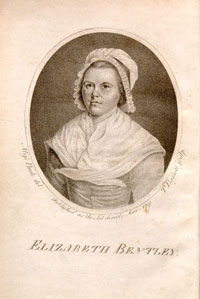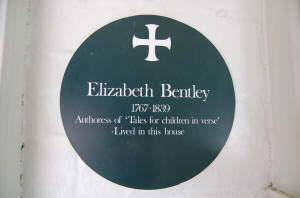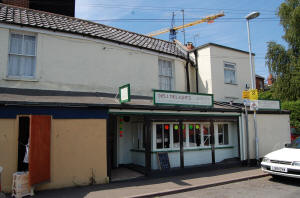|
|
| Elizabeth Bentley
Elizabeth Bentley was a highly respected poet in her day
but is now largely forgotten. She was born in Norwich in 1767
- the only child of Daniel and Mary Bentley. When she
was 10 years old her
father, who was a shoemaker and journeyman, suffered a stroke which
left him paralysed
him down one side.

Elizabeth Bentley

Elizabeth Bentley
Plaque

St Stephen's Square,
Norwich
However, Daniel Bentley still had the use of his
right hand and taught his daughter to read and write.
Later in life she would run a small boarding school.
Soon after her father's death in 1783 Elizabeth began
writing poetry. Her early work was influenced by Alexander Pope, John Milton and Oliver Goldsmith
and was published in the Norfolk Chronicle. She soon came to the attention of the United Friars -
a group set up in 1785 to further the arts and sciences
and whose members included Bartlett Gurney, the architect.
This group secured a list of subscribers for her and a volume of her work was published in 1791.
Her subjects included: anti-slavery pieces, poems about
royal deaths, poems about Norwich citizens, cruelty to animals,
education and also the new
Norfolk and Norwich Hospital. For many years she lived
at St Stephen's Square - close to the hospital. Here is
her poem:
|
See where yon
spacious structure meets the eye!
When, wing'd with zeal, intent on mortals' good,
Fair Charity, first offspring of the sky,
Left her celestial realms for earth's abode.
Descending, here she fix'd her gracious seat;
When Indigence the shaft of Pain receives,
Her hand conducts him to this blest retreat,
Here soothes his anguish, and each woe relieves.
Here sage Professors of the healing art,
Whose souls divine Benevolence inspires;
Their time employ, their wealth, their skill impart,
Before whose eyes Death, with slow step, retires.
The halpless wretch to dire Disease a prey,
From his untimely fate they kindly save;
With friendly hand each healing balm convey,
And snatch the body from the gaping grave.
With equal care they teach the soul to trace
Those regions for her future life design'd;
Expand the thoughts beyond earth's narrow space,
And raise from dark Despair th' immortal mind.
Hail, sacred fabric! gen'rous mortals hail!
By Charity inspir'd, these walls you fram'd;
Where'er her sway shall o'er the world prevail,
Shall your unfading honours be proclaim'd. |
|
In 1821, a second volume was published entitled:
Poems being the Genuine Compositions of Elizabeth
Bentley.
One of her most successful poems was a celebration of
Nelson's victory at Trafalgar - An Ode on the
Glorious Victory over the French & Spanish Fleets, on
the 21st October 1805 and the Death of Lord Nelson. Here is a verse:
|
To him (thro'
Heav'n) his country owes,
Salvation from the vaunting foes,
They meet a briny grave;
Tis Nelson, whose exalted mind,
With virtue's purest flame refin'd,
Still foremost of the brave,
Who in her cause so oft has bled,
His last, his vital drop has shed,
That country still to save. |
Here is another poem - this time a sonnet about
education:
|
|
When infant Reason first exerts her sway,
And new-formed thoughts their earliest charms
display;
Then let the growing race employ your care
Then guard their opening minds from Folly’s snare;
Correct the rising passions of their youth,
Teach them each serious, each important truth;
Plant heavenly virtue in the tender breast,
Destroy each vice that might its growth molest;
Point out betimes the course they should pursue;
Then with redoubled pleasure shall you view
Their reason strengthen as their years increase,
Their virtue ripen and their follies cease;
Like corn sown early in the fertile soil,
The richest harvest shall repay your toil.
|
In 1831 she published Tales in Verse for the
Entertainment of Children. This sold for a shilling
a copy and its success soon encouraged her to publish a
second volume. Her final years, however, were spent in Doughty's Hospital - located on what is now Calvert
Street - a hospice for the elderly poor. Her burial site
is unknown (?). |
Links:
Genuine Poetical Compositions
|
|

